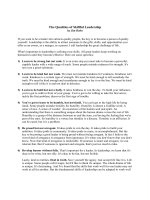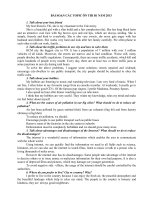Instructional Leadership topic 1
Bạn đang xem bản rút gọn của tài liệu. Xem và tải ngay bản đầy đủ của tài liệu tại đây (1.36 MB, 15 trang )
Objectives
By the end of the course you will have:
Developed a supported stance of what effective
leadership means in YOUR context.
A firm understanding of the latest school leadership
literature.
Discussed a number of key personal and systemic
leadership issues with fellow educators
Formally and informally reflected upon leadership.
Enjoyed your learning.
1
Session. Pulling it Together
Objectives:
To construct an understandings of what educative
leadership means based on our work so far.
To attach some practical strategies/meanings to the
concept of educative leadership.
To continue to pull together personal beliefs and
constructs of leadership.
To debate different approaches to leadership.
Leadership is action, not position.
2
The base for pulling together - Values
Values act as preferences, dictating school leaders’ actions
The influence of values most apparent in ill-structured problems
where values act as substitutes for knowledge
Values function as long-term goals to integrate school leaders’
comprehensive school visions
The more discretion the school leaders have, the greater the
influence of values.
Common values of school leaders are “general moral values”
and “social and political values
The more effective school leaders have clearer ideas of their
value priorities. (Leithwood & Associates)
3
It’s about Learning
Leaders’ learning
Organizational Learning
The Learning Community
Educative Leadership
Stoll, Fink, &Earl (2002). It’s about Learning (And It’s about Time. London:Routledge/Falmer.
4
A school statement: educative Leadership
Align the schools functions and decisions with the purpose.
At our school we acknowledge that every person is a
champion of change and that along the
change/improvement/growth journey the leadership team
cannot mandate what matters. What matters is the
business of the whole school community and it is the role
of the leadership team to interdependently support, model
and challenge across the school.
5
Pedagogical Leadership
It is not enough just to be able to talk about what it
means to teach numeracy; someone in the school has to
be able to take the lead in improving numeracy. What
leadership practices support numeracy improvement in
your school?
Pedagogical or Instructional leadership roles can include:
• The principal as a quality controller of classroom practices and
teachers programs
• The principal as a moderator of student assessment standards
• The principals as an initiator and facilitator of staff professional
learning about classroom practices
6
Educative Leaders
•
•
•
develop and nurture a climate that promotes inquiry,
value problem solving and welcome criticism (use it
constructively),
ensure that every staff member has the opportunity to
participate in the learning process (innovation, change,
staff development).
They make their leadership real.
7
Making it real
Form into Learning Leadership
Teams
Accept the challenge
Brainstorm strategies
Report one strategy to the whole
group.
8
Challenge 1
Form a Learning Leadership Team
the purpose is to ‘learn’ together how to improve the process
of teaching.
Who will be on it?
How will it be formed?
When will it meet
How will it operate?
What power will it have?
Sample Strategy: Invite your staff to elect 5
teachers to comprise the Learning Leadership
Team. They would meet once a month to plan,
review and monitor literacy and numeracy teaching
in the school. The team would report directly to
the General Staff Meeting.
9
Challenge 2
Promote reflection on practice by
teachers
How will you go about it?
What strategies will you use to motivate staff to be involved?
How will it operate?
What power will it have?
Sample Strategy: Hold your staff meetings in
different teachers classrooms on a rotational basis,
with each ‘host’ teacher having to talk about what
their class has been doing in the last week
10
Challenge 3
“Routine is the death of consciousness”, the
educative leader constantly encourages his
or her staff to break with routines, to seek
new ways of teaching and learning in their
classrooms.
How will you go about it?
What strategies will you use to motivate staff to be involved?
How will it operate?
Sample Strategy: Arrange Relief Teachers so that all
teachers get to visit another school for half a day
to investigate how they teach reading recovery
11
Challenge 4
Enable staff to seek critical feedback
from others.
How would you go about it?
What strategies will you use to ensure staff do not feel threatened by
this?
How will it operate?
Example strategy: forming teachers into pairs of
critical friends at the start of each year
12
Challenge 5
Create the conditions in which teachers
are prepared to work above and
beyond the official call of duty,
entirely of their own volition, to
enhance learning.
How would you go about it?
What strategies will you use to motivate staff?
What are the risks?
Example strategy: Keep a weekly record of teacher’s
achievements and send each one a letter at the
end of each semester outlining what these have
been.
13
Challenge 6
Create the time needed to be an
educative leader.
How would you go about it?
What strategies will you use to review your workload?
What are the risks?
Example strategy: Find a Critical Friend, meet
monthly at breakfast and discuss your educative
leadership acts for the period. Make “what I have
achieved towards improving learning” the only
agenda item. .
14
Be an Educative Leader
1. Make connections
2. Attend to staff motivation
3. Understand and express emotions
4. Believe in success
5. Be part of a community of learners
6. Engage in inquiry learning
7. Foster creativity
9. Find the time
8. Enable practice
15









